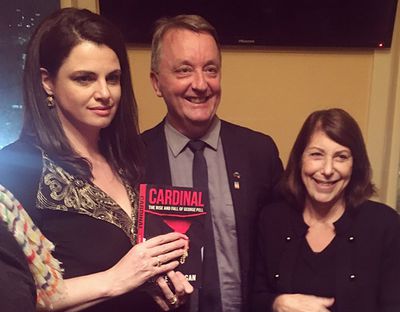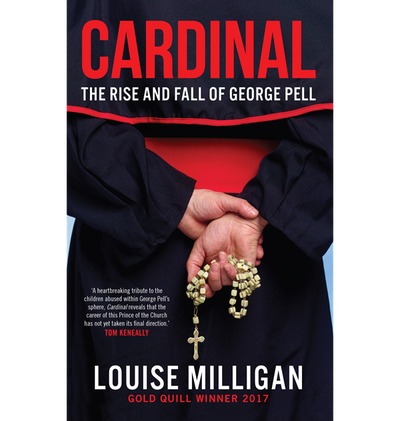Martin Foley launches Louise Milligan’s book Cardinal
By Martin Foley MP

On Wednesday 17 May, Louise Milligan’s Cardinal: The Rise and Fall of George Pell was launched by Martin Foley MP, Minister for Housing, Disability and Ageing, Mental Health, Equality, and Creative Industries, at the intimate setting of The Last Jar in Melbourne.
The launch was attended by an audience of friends, family, survivors, supporters and media, and Minister Foley gave a passionate, heartfelt speech about the culture of the Catholic Church and the stories of human suffering and endurance in the book.
The Minister has kindly allowed us to publish his speech here.
Good evening,
To begin, I would like to acknowledge the first peoples and traditional owners of this land, the people of the Boon Wurrung and Wurundjeri people of the Kulin Nation.
I pay my respects to their Elders past and present and Elders from other communities who may be here today, representatives of the world’s longest continuing culture.
To the author, Louise Milligan – at a time when the death of journalism has been so regularly predicted, this work shows the best side of your noble calling.
This work reflects the finest traditions and holds out hopes that well-researched, evidence-based journalism remains a pillar not only of our democratic system but of an accountable and decent civic culture, where the strong and powerful cannot automatically assume their position to be beyond reproach.
To my friends from Melbourne University Press – for, as they say, publishing books with spine.
To people of faith – from many perspectives, survivors of sexual abuse, their allies and supporters.
Ladies and gentlemen, I was told I could speak for as long as I like – but as the first murderer in Richard III put it: ‘’tis better to be brief than tedious’.
This is a difficult book that deals with difficult issues. It makes challenging findings and levels grave allegations, whilst leaving the issues of guilt and innocence to the processes of the law and the rightly independent processes of the Director of Public Prosecutions and Victoria Police.
As a member of the executive of the state of Victoria, it is not my role nor my intention to enter the space of guilt or innocence of those subject to allegations made here. Allegations, I note, that are strongly denied. That would be both inappropriate and counter to the efforts of those who seek justice for the events detailed in the book and would deny the presumption of innocence so central to our system.
It is my role to launch this book that deals with the story of sexual abuse, cover-up and the culture and practice of a Church and society that at best stood back and allowed it all to happen, or at worst was an active conspirator and perpetrator in its worst aspects – all highlighted through the career of the Prince of the Church, George Pell.
To those of us raised as Catholics in the 1970s, this book goes beyond the ‘there but for the grace of God go I’ and turns upside down our worldview of the Church that we were raised in.
To those of us with family and friends in the communities set out in the book, it is deeply personal – and traumatic. To the survivors, it is testimony to their suffering and endurance.
Too many of the Catholics of my generation grew up in a culture of unquestioned clerical power, of leadership and a conservative, hierarchical view of faith that had its coming together in a sense of power that drove to unimaginable outcomes detailed here.
We see a Church culture where the institutions of power and authority cemented and then decayed into a pattern of cover-up, betrayals, abuse of innocence, and illegality. We see not isolated but systematic brutal and criminal activity, covered up and institutionalised denial.
It poses existential questions for the future of the Church as a leader of the faith and the work of millions of decent Australians.
This is not the culture of Church-based pastoral care or compassion, the Church highlighted by Matthew 25’s worldview:
… for I was hungry and you gave me food; I was thirsty and you gave me drink; I was a stranger and you made me welcome; naked and you clothed me; sick and you visited me; in prison and you came to see me.
The Church in this book is a powerful, inward-looking institution: unaccountable, unresponsive and uncaring; battling for its own sense of self, its own soul, and found wanting; corrupt in the truest sense of the word, in that it is not true to its mission.
After reading this book, you are left with both loathing and shock, yet amongst the devastating stories strangely hope and even sympathy for the role of the Church in the modern world emerges.
But it is for the victims and their stories – those of the families, those of the supporters left behind with their grief or their determination for if not justice then at least reconciliation and closure – that we are left with profound sympathy and support for their struggles.
The difficult questions that the book poses of course deal with the issue of the day: what did the Cardinal of the one true, holy, Catholic and Apostolic Church, George Pell – the highest ranking Catholic Church official in the nation and now a global Church leader – know about the terrible crimes of sexual abuse, the cover-ups, the consequences and the role he may or may not have played in them?
A man destined almost from the start for greatness and high office in the church. Yet that greatness comes at the intersection of terrible forces, which pose both issues of personal responsibility and questions of collective leadership.
So I will close with the lines of the founder of the firm from the ‘sermon on the mount’, reflections on what happens when we build institutions on uncertain foundations:
Foolish was the man who built his house upon the sand: and then the rain descended and the floods came and the winds blew and beat upon this his house, and it fell and great was the fall of it. (Matthew 5-7)
Let us hope this book is a contribution to highlighting those unsustainable foundations of the Church and the hopes for an alternative: a Church that reconciles with its victims and acknowledges its role in that tragedy, and resets its place in a modern world.
I wish the book well. And, as Louise finishes by noting, let us hope it honours all of the people whose childhoods were blighted by clergy abuse, honours the families who lost sons and daughters before their time, and honours the families who continue to struggle with its legacy.
Thank you.
Louise Milligan is an investigative reporter for ABC TV’s 7.30 and Four Corners. She has covered the Royal Commission into Institutional Responses to Child Abuse and won two Gold Quill awards for her reporting on the issue. Milligan is Irish-born and was raised a Catholic.
Cardinal: The Rise and Fall of George Pell is out now.



